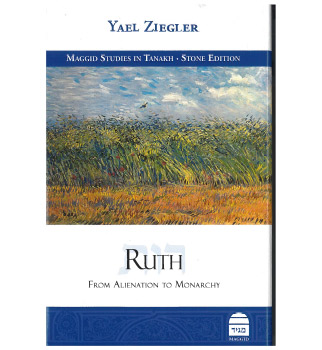In a few weeks, on the holiday of Shavuot, Jewish communities around the world customarily read the biblical book of Ruth.
Shavuot is a harvest holiday, so perhaps the custom arose because the action in Ruth takes place during the harvest season. Or perhaps Ruth’s famous declaration to her mother-in-law, Naomi, seems appropriate for Shavuot, the holiday that commemorates the acceptance of the Torah by the Jewish People at Mount Sinai: “Do not urge me to leave you, to turn back and not follow you. For wherever you go, I will go; wherever you lodge, I will lodge; your people shall be my people, and your God my God.” (Ruth 1:16)
At 85 verses, the book of Ruth is one of the shortest in the Bible. A readable and easily understandable short story, it has moving dialogue and a small cast of characters. In a certain sense, it’s a story about the courtship and marriage of Ruth and Boaz, and the establishment of the family from which King David later descends.
Yael Ziegler, a young Israeli Bible teacher from an American background, has now published a hefty volume (almost 500 pages) of analysis and commentary on the book of Ruth. Ziegler is a leading member of the cadre of modern religious Bible scholars in Israel who combine the best methods of literary analysis of the biblical text with a judicious sampling of midrashic interpretations by the classical rabbis.
She explains the logic of combining these two methods: “We have seen that hazal [the classical rabbis] often make observations similar to those made by modern scholars who employ literary tools.”
She is acquainted with the writings of modern Bible critics, but her approach is not theirs.
Her fascinating analysis of the unusual courtship of the male and female protagonists, Boaz and Ruth, makes their relationship sound very modern in some ways, but not in others.
Building on the work of literary scholar Robert Alter (in The Art of Biblical Narrative), Ziegler shows how the first meeting of Boaz and Ruth follows the literary “type scene” of a couple who meet at a well and later marry. The first time Boaz meets Ruth, he is a wealthy landowner and she is gleaning in his field, as needy people did in ancient Israel. Boaz invites her to eat and drink: “When you are thirsty, go to the jars and drink some of [the water] that the men have drawn.” (Ruth 2:9)
In many ways, their first meeting resembles that of Moses and Zipporah (Exodus 2:15-16), Jacob and Rachel (Genesis 29:9-10), or Abraham’s servant, acting as Isaac’s agent, and Rebecca (Genesis 24:17-19). In all four of these scenes, the meeting and the offer of water introduce the couple that will later marry.
But Ziegler outlines two significant differences in the Ruth story. As Alter had already noted, in the other stories, the match is initiated when the man travels to the woman’s territory. Here, though, Ruth comes onto Boaz’s turf, either accidentally or on purpose, to initiate the meeting. Ziegler then notes further that in this scene, nothing happens! The couple meet, an offer of drink is made, they exchange pleasant words, and they both go their own way.
Nothing happens, as Ziegler points out, until after Ruth, prompted by her mother-in-law, Naomi, realizes that further action is required. Ruth sets out to meet Boaz alone at night in what is, as Ziegler proves through careful language analysis, an attempt to seduce him.
Ziegler notes that both Ruth and Boaz had ancestors who played a role in such seduction scenes. Ruth’s ancestor, Lot, was seduced by his own daughter, who was certain that the continuity of humanity depended on her actions. (Genesis 19:30-38) One of Boaz’s ancestors, Tamar, seduced her father-in-law, Judah, again because she feared that the continuity of her late husband’s line would cease. (Genesis 38:14-18) Ruth, too, sets off to seduce Boaz in order to preserve the line of her late husband.
Again, the differences are more important than the similarities. In the earlier stories, Lot and Judah slept with the woman who had seduced them, without knowing who she was. In our story, as soon as Boaz wakes up and finds a woman sleeping at his feet, he pointedly asks, “Who are you?” (Ruth 3:9) Ziegler argues convincingly that nothing sexual occurs between Boaz and Ruth that night, even though seduction was the original plan.
Ziegler adds that “the narrative consciously and consistently avoids any indication of romantic involvement between Boaz and Ruth.”
The book of Ruth is a story of two exemplary people who both realize the sterling qualities of the other. (Boaz admires Ruth’s kindness to her mother-in-law in Ruth 2:11-12; Ruth acknowledges Boaz’s kindness to herself in 2:13.)
“The book of Ruth consistently eschews the customary biblical hints of love or romance between Ruth and Boaz. We find respect, admiration and gratitude, but not passionate feelings… The book of Ruth emphasizes that the relationship of Boaz and Ruth is founded on the willingness to fulfil their responsibilities, even at great personal expense.”
As much as we might wish it to be a love story, Ziegler proves that it is not. But she brings the story to life in a readable style that should engage any interested reader of the Bible.
